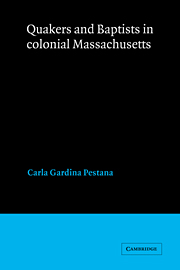5 - Leadership
Published online by Cambridge University Press: 22 October 2009
Summary
The development of systematic approaches to sectarian leadership was perhaps the single most important component of the organizational transformation that occurred in the Boston Baptist Church and the Salem Quaker meeting in the years before 1740. This aspect of their organizational development – like all other aspects – was informed by either scriptural models or the reforms designed by the Society of Friends, and the distribution of authority in each sect differed accordingly. With authority in the Baptist church more narrowly focused, the Baptists eventually found it difficult to locate adequately qualified laymen to fill the position of elder. They finally moved beyond this impasse by embracing the distinction, common in the established churches, between laity and clergy. This solution created ties between the Baptists and the establishment that have been applauded by scholars interested in the development of religious toleration; but it also undermined the autonomy of the Baptist church.
The Quakers at first had trouble accepting a formal leadership at all, but they eventually instituted practices that ensured their continuing independence. Once the local meeting had adopted the institutional structure emerging within the Society of Friends, it proceeded to erect the various offices utilized within the society without noteworthy difficulty. The system adopted by the Quakers preserved their distance from the other religious groups in the colony and permitted a flexible approach to filling its various posts. Although leadership in both the Baptist church and the Quaker meeting became more clearly defined over time, the implications of these ostensibly similar transformations for the functioning of either sect could not have been more different. Again, routinization was not a uniform process for the sectarians of colonial New England.
- Type
- Chapter
- Information
- Quakers and Baptists in Colonial Massachusetts , pp. 102 - 119Publisher: Cambridge University PressPrint publication year: 1991



